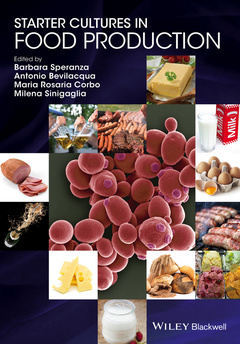Description
Starter Cultures in Food Production
Coordinators: Speranza Barbara, Bevilacqua Antonio, Corbo Maria Rosaria, Sinigaglia Milena
Language: English
Subject for Starter Cultures in Food Production:
440 p. · 17.3x24.6 cm · Hardback
Description
/li>Contents
/li>Biography
/li>
Starter cultures have great significance in the food industry due to their vital role in the manufacture, flavour, and texture development of fermented foods. Once mainly used in the dairy industry, nowadays starter cultures are applied across a variety of food products, including meat, sourdough, vegetables, wine and fish. New data on the potential health benefits of these organisms has led to additional interest in starter bacteria.
Starter Cultures in Food Production details the most recent insights into starter cultures. Opening with a brief description of the current selection protocols and industrial production of starter cultures, the book then focuses on the innovative research aspects of starter cultures in food production. Case studies for the selection of new starter cultures for different food products (sourdough and cereal based foods, table olives and vegetables, dairy and meat products, fish and wine) are presented before chapters devoted to the role of lactic acid bacteria in alkaline fermentations and ethnic fermented foods.
This book will provide food producers, researchers and students with a tentative answer to the emerging issues of how to use starter cultures and how microorganisms could play a significant role in the complex process of food innovation.
List of contributors vii
Preface xi
1 Lactic acid bacteria as starter cultures 1
Clelia Altieri, Emanuela Ciuffreda, Barbara Di Maggio and Milena Sinigaglia
2 Yeasts as starter cultures 16
Pietro Buzzini, Simone Di Mauro and Benedetta Turchetti
3 Fungal starters: An insight into the factors affecting the germination of conidia 50
Philippe Dantigny and Antonio Bevilacqua
4 Non‐starter bacteria ‘functional’ cultures 64
Patricia Ruas‐Madiedo and Ana Rodríguez
5 Industrial production of starter cultures 79
Sanna Taskila
6 Safety evaluation of starter cultures 101
Pasquale Russo, Giuseppe Spano and Vittorio Capozzi
7 Management of waste from the food industry: A new focus on the concept of starter cultures 129
Daniela Campaniello, Salvatore Augello, Fabio de Stefano, Stefano Pignatiello and Maria Rosaria Corbo
8 A new frontier for starter cultures: Attenuation and modulation of metabolic and technological performance 148
Antonio Bevilacqua, Barbara Speranza, Mariangela Gallo and Maria Rosaria Corbo
9 The role of the pangenome concept in selecting new starter cultures 162
Antonio Bevilacqua, Francesca Fuccio, Maria Clara Iorio, Martina Loi and Milena Sinigaglia
10 Commercial starters or autochtonous strains? That is the question 174
Maria Rosaria Corbo, Angela Racioppo, Noemi Monacis and Barbara Speranza
11 Sourdough and cereal‐based foods: Traditional and innovative products 199
Luca Settanni
12 The role of starter cultures and spontaneous fermentation in traditional and innovative beer production 231
Antonietta Baiano and Leonardo Petruzzi
13 Wine microbiology 255
Patrizia Romano and Angela Capece
14 Starter cultures in vegetables with special emphasis on table olives 283
Francisco Noé Arroyo‐López, Antonio Garrido‐Fernández and Rufino Jiménez‐Díaz
15 New trends in dairy microbiology: Towards safe and healthy products 299
Ana Rodríguez, Beatriz Martínez, Pilar García, Patricia Ruas‐Madiedo and Borja Sánchez
16 Sausages and other fermented meat products 324
Renata E.F. Macedo, Fernando B. Luciano, Roniele P. Cordeiro and Chibuike C. Udenigwe
17 Fermentation of fish‐based products: A special focus on traditional Japanese products 355
Takashi Kuda
18 Traditional alkaline fermented foods: Selection of functional Bacillus starter cultures for soumbala production 370
Labia Irène I. Ouoba
19 Ethnic fermented foods 384
Marianne Perricone, Ersilia Arace, Giuseppe Calò and Milena Sinigaglia
Index 407
About the Editors
Barbara Speranza, Antonio Bevilacqua, Maria Rosaria Corbo, and Milena Sinigaglia, Department of the Science of Agriculture, Food and Environment (SAFE), University of Foggia, Italy.
These books may interest you

Innovations in Traditional Foods 217.38 €



